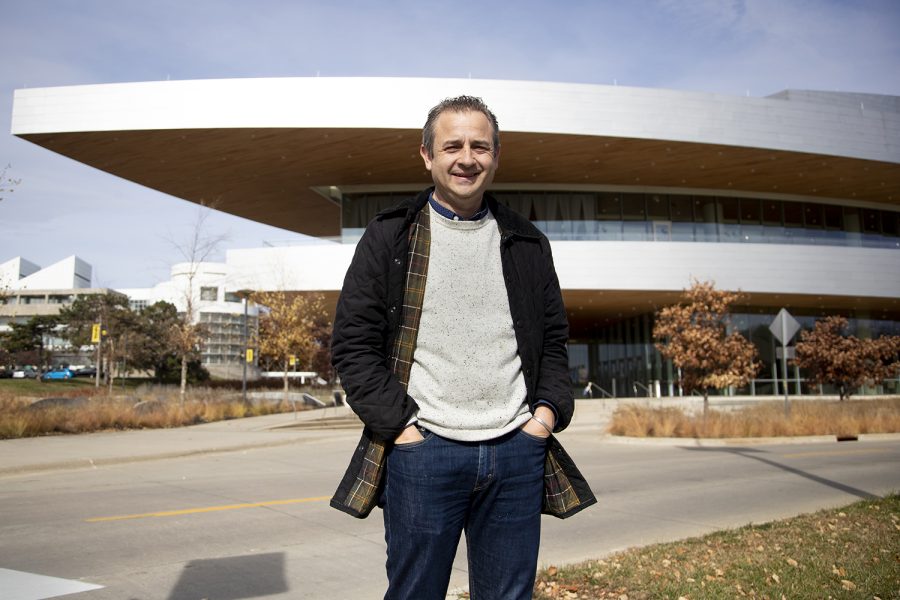Hancher Auditorium hires programming and engagement director
Aaron Greenwald started as programming and engagement director on Oct. 27 and said he plans to help achieve the auditorium’s goal of broadening its reach in the UI and Iowa City community.
Aaron Greenwald, the new programming and engagement director of Hancher Auditorium, poses for a photo outside of Hancher on Thursday, Oct. 27, 2022.
October 30, 2022
As the new Hancher Auditorium programming and engagement director, Aaron Greenwald wants to broaden the auditorium’s reach in the University of Iowa and Iowa City communities.
Greenwald, who has over 20 years of experience in the arts, started the position on Oct. 17. He is the first person to fill the position since it was left vacant by Paul Brohan during the pandemic. Since his career began in 1999, he has worked in various positions related to visual and performing arts across the U.S.
He found his first job in the fine arts in New York City, where he worked as producer and director of public programs. He later moved to Durham, North Carolina, in 2005 to work at Duke University. Greenwald worked at Duke Performances as executive director for about 12 years and performed many of the same tasks that he does at Hancher.
After leaving Duke Performances in 2019 and working in Knoxville, Tennessee, from 2020-22, Greenwald said he felt like it was time for a change.
He said he was drawn to the Midwest because he is interested in art made from places other than the east coast. Hancher Auditorium and Iowa City specifically stuck out to him because of the community, he said.
“The values that animate a place like this are very, very attractive,” Greenwald said. “I mean, not only being at a public institution of higher learning, but also being in a community that seems to really take its responsibilities as a community seriously.”
Greenwald said a major goal in his new position is to get a variety of artists and performances to Hancher Auditorium and to various performing arts spaces around Iowa City — including the Voxman Music Building and the Englert Theatre.
Greenwald said Hancher can be an asset to the arts community and support a variety of artists. Even though the auditorium brings in big artists, the space also needs smaller acts to perform.
“We also need to support artists who draw a smaller quantity of people that are still making really important and interesting work,” Greenwald said.
Greenwald also wants to attract more students to Hancher, he said.
“That’s achieved by two ways: one is bringing things that are already attractive to students, and then the other is to be real evangelists with the students about what it is that we’re offering here and why they would find the experience compelling,” Greenwald said.
RELATED: Clay Aiken to host ‘Wheel of Fortune’ live at Hancher
Eric Oberstein, a close colleague of Greenwald’s at Duke Performances and current managing director at Harlem Stage in New York City, said Greenwald had a positive impact on Duke Performances during his time there.
Oberstein said Greenwald brought many different art forms to Duke Performances, including music, dance, theater, literature, and spoken word performances.
“I would say what made people very excited about him was he was fearless and also really an omnivore in terms of his artistic tastes,” he said. “Aaron is very well-versed across disciplines.”
André Perry, Hancher Auditorium’s executive director, said Greenwald was a great fit for the programming and engagement director position because of how much their visions for Hancher’s future aligned.
“I think his strengths, his experiences are a great complement for what myself and other members are bringing to the table,” Perry said. “And just his vision — in addition to that — was also really strong, so he was just the perfect person.”
Greenwald’s wide variety of experience and his desire to connect Hancher to other art departments at the UI is exactly what Hancher needs to move toward the future Perry and his team envision for the auditorium, Perry said.
“One of the reasons we’re going in this direction is we’re really trying to build a collaborative approach to our programming,” he said. “We’re really trying to design a model where there’s a lot of input, and we need a leader who’s gonna be able to help to focus that input toward the vision we’re trying to carry out.”
For Greenwald, it’s important that Hancher Auditorium continues to look toward the future of the fine arts.
“We need to figure out the next generation of artists that we need to have as our partners so that we might present them several times over the course of the year, or several over the course of a number of years,” Greenwald said. “They can be in deeper conversation and engagement with our campus and community.”



